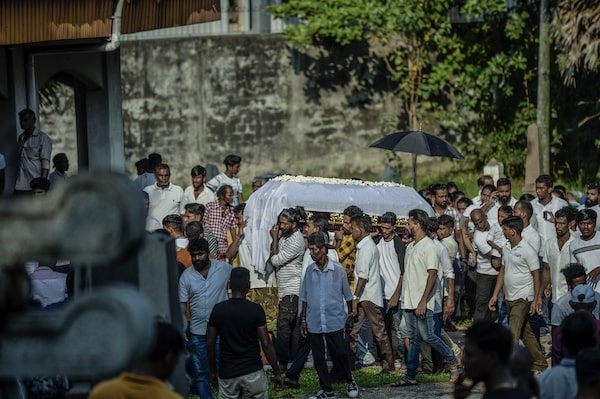Senthan Selvarajah is co-director of the Centre for Media, Human Rights and Peacebuilding based in the U.K.
The Easter Sunday terrorist bombings in Sri Lanka, which left more than 350 people dead and more than 500 injured, surprised and shocked not only those in the country but people around the world. The Sri Lankan government has blamed the Islamist splinter group National Thowfeek Jamaath. The government is also investigating the role of international terrorism after Islamic State claimed responsibility for the attacks, saying they were in “retaliation” for last month’s mosque attacks in Christchurch, New Zealand.
The past few years have seen international Islamic terrorist organizations carrying out cruel attacks in all parts of the world. However, there have been no previous historic problems with international Islamic terror in Sri Lanka.
While there has been relative peace since the end of the civil war 10 years ago, new forms of strife have emerged between ethnic and religious groups in the country, which could be easily manipulated by international terror organizations.

Mourners carry the coffin of a victim of the Easter Sunday Bombings at a local cemetery on April 24, 2019, in Colombo, Sri Lanka.Atul Loke/Getty Images
Sri Lanka’s 26-year-long civil war was a bloody conflict between the majority Sinhalese who are mostly Buddhist, and the Tamils who are a minority nationally but a majority in the north and east comprised of Hindus and Christians. The war ended in 2009 with the defeat of the Tamil Tigers, a militant separatist organization.
Similar to Tamil people, the Muslim minority in Sri Lanka has also been subjected to various oppressions by successive governments since independence in 1948.
During the postwar period, conflicts between the Sinhala and the Muslim communities largely widened. In particular, violence was unleashed by hardline Buddhist Sinhalese groups in June, 2014, and in the months of February and March, 2018. State forces acted partial to Sinhalese people, which in turn instigated Muslim extremist activities.
Some Muslims, holding feelings of bitterness and disappointment, can unfortunately be easily manipulated by international Islamic organizations, and especially in a place such as Sri Lanka, where Buddhist extremism has recently clashed with the Muslim minority. So we just can’t say for sure that the Easter Sunday attacks on Christians weren’t in retaliation for the massacre of Muslims in New Zealand as the Islamic State claims.
For the past few years, information about this growing Muslim extremism in Sri Lanka and the links formed with the Islamic State had become public. In 2016, the Sri Lankan government said about 32 Sri Lankans had gone to Syria and Iraq to fight with the Islamic State.
On Jan. 17, four youths were arrested in Wanathawilluwa, on the island’s western coast, on suspicion of terrorist activities. Four barrel loads of explosives amounting to 100 kilograms and 100 detonators were seized along with certain religious books. Authorities indicated the arrested youths were planning to destroy sacred Buddhist shrines. This was a clear signal of future terrorist risk, but seems to have been largely ignored. That same month, an investigative piece detailed the nexus of the Islamic State formed under the leadership of Jamaat-e-Islami in South Asia, including Sri Lanka.
It was reported that information about potential suicide attacks had been passed on by foreign intelligence to the Sri Lankan security agencies 10 days before the Easter bombings. Why the government did not take action is a question being raised by many.
The large split within the Sri Lankan Army structure is one reason why pre-empting these attacks would have been impossible. The army is split into pro-President, pro-Prime Minister and pro-former-president factions. There is also a section of the military loyal to the former defence secretary Gotabaya Rajapaksa. Meanwhile disputes between the President and Prime Minister, who belong to two different parties, have weakened the security of the country.
The internal clashes among the people and government cannot be ignored any longer. The civil war may have ended 10 years ago, but the conflict still remains and the root causes are still there and growing fast. As long as there are conflicts, grievances and animosity among the communities, the foreign-terror elements would make use of the differences to their benefit.
To avoid this, as stated by the former chief minister of the Northern Provincial Council, Justice C.V. Wigneswaran in his message on the terror attacks: “It is very necessary that our constitution and our laws are changed to give equal status to all communities and religions. They must all be entitled to protection equally by the government." Sri Lanka, as scholars such as Israeli geographer Oren Yiftachel argue, is an ethnocratic state such as Serbia, Iran, Estonia, Sudan, Malaysia, Turkey and Israel.
The current situation demands a change in the mindsets of leaders to take courageous and bold steps to bring about peace and stability. Until then, peace will remain elusive in Sri Lanka.